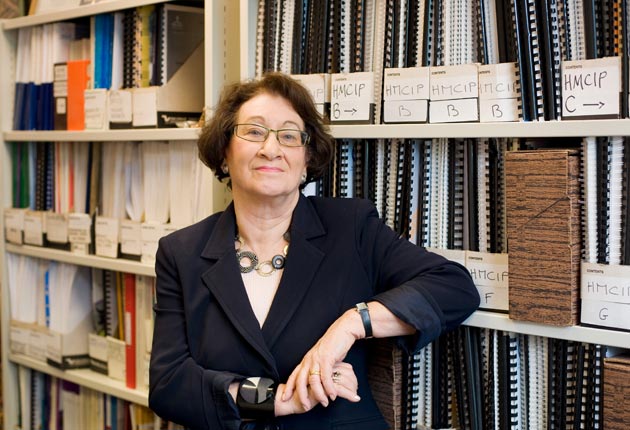Rape laws to be rewritten
Landmark review finds 'shocking' failures to investigate and prosecute effectively / Forensic medical evidence should be gathered by NHS, not police, ministers urged

The reporting, investigation and prosecution of rape in England and Wales must undergo a fundamental change or thousands more women will continue to be failed by the criminal justice system, a landmark review finds today.
The far-reaching conclusions on how to tackle the crime of rape follow a series of high-profile scandals in which victims have been ignored and rapists have escaped detection. Baroness Stern, who has headed the five-month review of the treatment of rape victims, said that recent failures of specialist police units and sexual-crime prosecutors needed to be urgently addressed. The findings come the day before the Crown Prosecution Service (CPS) in London is expected to face further criticism by the CPS inspectorate of its handling of rape cases.
Lady Stern described rape as a unique offence where the issue of a woman or man's consent could transform a lawful sexual act into a serious crime punishable by many years in prison. Therefore it required a different approach from other crimes. She said during her review she had uncovered "shocking police failures" during the investigation stage, as well as cases where rape offences were still not being prosecuted by specialist lawyers.
Evidence from 200 individuals concerned with the reporting, investigation and prosecution of rape led Lady Stern to conclude: "Sadly I have met some whose treatment by the authorities was appalling."
Among the range of new measures published today is the immediate transfer from the police to the NHS of forensic medical examination of rape victims, and the right for a victim to choose a woman doctor. Every victim of rape should be offered the support of a specialist adviser to help them to keep faith in the criminal justice system, the review suggests. It further recommended that all police forces in should have at least one sexual-assault referral centre.
Lady Stern also called for a greater emphasis on intelligence-led policing to avoid failures such as those in the cases of the rapists John Worboys and Kirk Reid in London. Both investigations involved men who were allowed to carry out attacks long after they should have been detected.
Myths surrounding rape also needed to be dispelled, said the crossbench peer, who warned that the truth about the prosecution of rape has become distorted by the misuse of statistics. Figures showing that only six out of 100 rape cases end in a successful conviction give women a misleading impression of failure in court and discourage the reporting of sex crimes. She says the true figure for the prosecution of rape cases is 58 per cent, based on the number of defendants convicted by a jury in a Crown Court.
Lady Stern also calls for fairer compensation payments for rape victims and research into the truth about the number of women who make false allegations of rape. She says the media and public must stop blaming rape victims who are taken advantage of when they are drunk.
In an interview with The Independent, she said: "Rape has a huge amount of baggage and history. It stirs very deep beliefs about relationships between men and women or men and power, and therefore it takes a while to get beyond all that. It's a very emotive subject."
Surveys show that third of the public think that some responsibility for rape can be attributed to the victim. Lady Stern said: "I think rape should be really discussed a lot. I think the idea that a woman going out at night and getting drunk and not minding herself can be compared with leaving your house door open so you are burgled really needs to be examined in the cool light of day. You need to ask: 'Do you really mean that?'
"Do you really mean that that she's to blame if she leaves her handbag a long way from her [in the case of theft], so therefore she's to blame if she gets drunk and is taken advantage of – really? That needs to be discussed."
Lady Stern added that many of the policies about rape were the right ones but that they were not being implemented properly. However, she acknowledged: "There is a tension between police targets encouraging officers to charge a certain number of suspects while prosecutors are discouraged from pushing through cases with weak evidence."
Her findings were welcomed by the Government, which has spent 13 years trying to persuade the public that the process of rape prosecutions has improved. The Solicitor General, Vera Baird, said: "Public perception of the way rape complaints are handled lags behind reality."
The Chief Crown Prosecutor, Sarah Jane Gallagher, who has a national responsibility for prosecuting rape, said the review effectively endorsed many practices already in place for prosecuting the crime.
She said: "We accept all of these recommendations and will continue to step up efforts to ensure that victim care is a priority and that our policies are translated into reality for victims and witnesses. Improving our performance in this important area of work will be a priority for us in the year ahead."
Chief Constable Dave Whatton, from the Association of Chief Police Officers, said police had "worked hard to change the way we deal with and respond to rape". Lessons had been drawn from the cases involving the serial rapists Kirk Reid and John Worboys, he said.
Mr Whatton added: "Rape is a uniquely difficult crime to investigate. Every inspection and review in recent years has agreed that in the UK we have great examples of best practice and some of the best training in the world available to investigators."
Bookmark popover
Removed from bookmarks